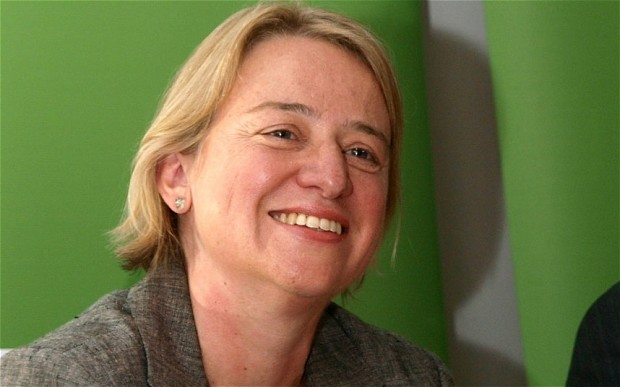An insurgent party confounding its critics and rising inexorably in the polls. An established party finding its core vote disillusioned and flirting with a more hardline, principled alternative. A renegade, sometimes controversial leader whose ideas are seen by many as antiquated, eccentric, even dangerous, yet whose popularity is on the up among their cultish supporters. This is not just the story of UKIP, but also increasingly that of Britain’s Green Party.
Over the last week, the Greens have consistently polled in fourth place, pushing the Liberal Democrats into a ruinous fifth. This is by no means proof of a cemented trend in public opinion, but quietly – almost unnoticed – the Greens’ support is growing. In 2010 they managed a meagre 1 percent of the national vote, in the last week they are polling as high as 8 percent.
Under Natalie Bennett’s leadership, the party has doubled its membership in the last nine months, meaning it is now at its highest level ahead of a General Election since 1989. There is some way to go before the Greens reach the popularity levels of UKIP, though they are rivalling Nigel Farage’s party and the Scottish National Party as the fastest growing in Britain. For our democracy, and indeed for the British political landscape in the future, this is a good thing.
“How?!” I hear you ask with some incredulity. Before my colleague James Delingpole tells me to go and stick my monthly invoice into a wind turbine, let me explain.
Say what you like about UKIP, but they have given a democratic voice to a group of people who were otherwise disenfranchised. The modernisation process of David Cameron’s Conservatives, rightly or wrongly, turned a significant number of people away from the party, effectively leaving them without a say at the ballot box. UKIP filled that void. The Greens can do a similar job on the left.
For some – I know – Ed Miliband’s Labour Party are just not left-wing enough. The populist remnants of Blairism, for these lefties of true principle, still remain. Where is the ideologically pure alternative to this centrist consensus, where Labour are – they believe – not much different from those evil Tories? The Greens, as UKIP did on the right, can fill that void.
Labour are growing more and more concerned that the Greens are parking their wind-powered tanks on their lawn. That is why they charged Shadow Cabinet minister Sadiq Khan with heading up an anti-Green attack unit, seeking to quell this sustainably-resourced uprising.
Labour fears the Greens could soon resemble a ‘UKIP of the left’, drawing wavering voters away from Miliband and potentially losing them the election. With Labour and the Tories neck and neck in the polls, and with those numbers translated into Commons seats, just a few more percentage points added onto the Green vote could be catastrophic for Miliband.
As things stand, the BBC is refusing to include the Green Party’s Bennett in the pre-election TV leaders’ debates, despite her party polling ahead of Nick Clegg’s. This seems grossly unfair for two reasons. First, the Greens merit a place at the debates because of their support among the electorate. Nearly 300,000 have signed an online petition calling for them to be allowed to take part.
Secondly, the current proposals are that Farage joins the three main party leaders in one of the debates. This would give significant airtime to a party seeking to divide the right-wing vote, yet deny a forum to one aiming to split the left. The advantage to Labour is obvious.
The Greens may oppose everything you hold dear. You may see them as a bunch of bonkers old hippies. Or, actually, you might respect their principled, refreshing approach to politics. Let the Greens take part in the TV debates, and let’s see if Labour have what it takes to stop them.

COMMENTS
Please let us know if you're having issues with commenting.